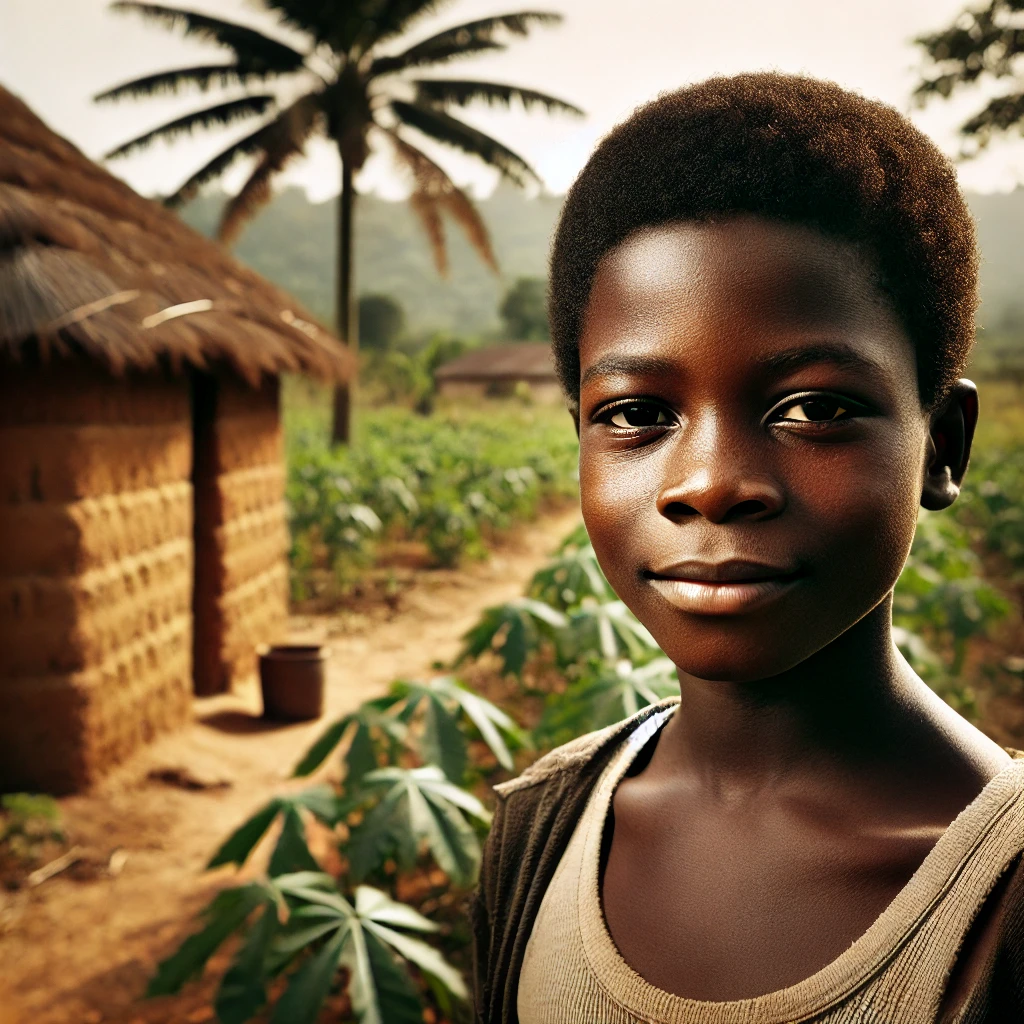

The Village Life, Tunde The Orphan Part 1, Nigeria Story
Tunde The Orphan Part 1,
The Village Life. A Nigerian Story.
 In a small, secluded village nestled within the lush, rolling hills of Oyo State, Nigeria, lived a young boy named Tunde. Only twelve, Tunde had already faced a lifetime of hardship. His parents, beloved members of the village, had passed away when he was barely old enough to understand loss, leaving him in the care of his aging grandparents, Mama Tinu and Baba Mufu.
In a small, secluded village nestled within the lush, rolling hills of Oyo State, Nigeria, lived a young boy named Tunde. Only twelve, Tunde had already faced a lifetime of hardship. His parents, beloved members of the village, had passed away when he was barely old enough to understand loss, leaving him in the care of his aging grandparents, Mama Tinu and Baba Mufu.
The village was a place where time seemed to stand still. It was surrounded by vast fields of cassava and yam farms, and the dense palm trees that bordered it swayed gently, creating a whispering chorus in the wind. The villagers led simple lives, bound to the earth and its rhythms. They rose with the sun to tend to their farms, and in the evening, they gathered by the flickering glow of lanterns to tell stories passed down through generations.
Tunde’s home was modest, a mud-walled structure with a thatched roof, which seemed to sag a little more with each passing year. Inside, it was dimly lit, with only a small window to let in the morning sun. Mama Tinu and Baba Mufu lived quietly, with a humble routine shaped by years of habit and resilience. They were known for their warmth and kindness, but they were no longer as strong as they had once been. The aches of old age had begun to slow them down, making it challenging to keep up with the duties required to raise a young boy.
Tunde, however, was not an easy child to raise. Consumed by the grief and loneliness that had settled deep within him, he had grown resentful and rebellious. His life felt hollow, and he often wondered why his parents had been taken from him. This bitter questioning turned into anger that he didn’t know how to control, and it spilled out in ways that troubled his grandparents.

Most days, Tunde could be found with the village boys, playing pranks on neighbors, sneaking into forbidden areas, and challenging authority at every opportunity. He was fearless—or perhaps he just didn’t care anymore. His friends marveled at his daring nature, and though they laughed at his wild antics, they could also see the darkness in his eyes, a storm no one else could calm.
Baba Mufu, a man of few words, observed his grandson’s behavior with a mix of sadness and frustration. With his thick white beard and a voice that echoed like the rumbling thunder before a storm, he would often scold Tunde, reminding him of the importance of respect and responsibility. But Tunde’s defiance was unyielding, his expression as hardened as a stone. The old man’s words seemed to bounce off him like raindrops on a roof.
Mama Tinu, on the other hand, tried to reach him through gentler means. She would cook his favorite meals, tell him stories of their ancestors, and pray over him when he wasn’t watching. She believed that beneath his rebellious exterior lay a heart that still remembered love and kindness, even if it was hidden behind walls of anger and grief.
Despite their efforts, Tunde rarely helped with chores around the house. When asked to fetch water from the stream or help with farm tasks, he would roll his eyes, mutter under his breath, or simply walk away. The tasks he ignored fell onto his grandparents’ frail shoulders, and though they bore it patiently, the strain was evident. Mama Tinu’s back had started to ache more often, and Baba Mufu, once a strong farmer, now found it difficult to even lift the smallest of yam sacks.
One day, after Tunde had run off to the river without permission, Baba Mufu sat on the front porch, watching the sun set over the cassava fields. The vibrant orange hues reflected in his eyes, but his gaze was clouded with worry. “I don’t know what will become of that boy, Tinu,” he muttered, his voice tinged with sorrow.

Baba Mufu sitting on the front porch of his home as the sun sets over the cassava fields, casting vibrant orange and purple hues across the landscape. His expression is one of sadness and concern as he gazes out over the fields, deep in thought. Mama Tinu sits beside him, placing a comforting hand on his arm as she looks at him with quiet determination. The scene is peaceful yet heavy with emotion, showing the weight of their worries.
Mama Tinu, sitting beside him, patted his hand. “He’s lost, Mufu. The spirits have taken his heart into the shadows. We must keep calling him back, as his parents would have done,” she replied softly. Her words held a gentle determination, a flicker of hope that refused to be extinguished.
 As night fell, Tunde returned, his clothes drenched from an afternoon spent swimming in the river. He entered the house, his expression unbothered, oblivious to the worry he had caused. Baba Mufu’s eyes narrowed, his patience wearing thin.
As night fell, Tunde returned, his clothes drenched from an afternoon spent swimming in the river. He entered the house, his expression unbothered, oblivious to the worry he had caused. Baba Mufu’s eyes narrowed, his patience wearing thin.
“Where have you been, Tunde?” he demanded, his voice resonating with authority.
Tunde shrugged. “Just by the river,” he answered, his tone indifferent.
“Did you forget that you were supposed to help your grandmother fetch water today?” Baba Mufu’s voice grew harsher, echoing in the quiet house.
Tunde rolled his eyes, a smirk forming on his lips. “It’s just water. She can get it herself.”
The words hung in the air, sharp and cutting. Baba Mufu took a deep breath, suppressing the anger that threatened to boil over. Mama Tinu placed a gentle hand on her husband’s arm, her eyes pleading for calm.
Without another word, Tunde turned and went to his corner of the house, leaving his grandparents in the heavy silence of his absence.
As the night deepened, Mama Tinu and Baba Mufu lay awake, their minds racing with worry. They knew that Tunde’s pain was real, that he was still mourning in his own way. But they also understood that time was running out; they wouldn’t be there forever to guide him. If he continued down this path, he would end up lost in ways that no one could bring him back from.
Outside, the village was quiet. The palm trees stood still, and the only sounds were the distant calls of night birds and the rustling leaves. The darkness seemed to press in closer that night, as if bearing witness to the boy’s struggle—a silent observer of a young life drifting between anger and redemption, on the edge of something neither he nor his grandparents could yet foresee.

A night scene inside the dimly lit mud-walled home. Baba Mufu and Mama Tinu lie awake on a simple mat, each lost in their thoughts. Their faces are etched with worry, reflecting the weight of Tunde’s struggles. The room is minimal, with simple furnishings, and a small window lets in a sliver of moonlight. Outside, the village is still, with palm trees visible through the window, silhouetted against the night sky, creating a sense of quiet foreboding.













You must be logged in to post a comment.